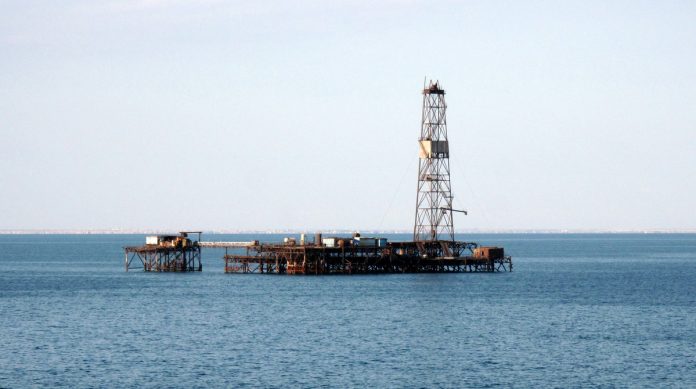The leaders of Azerbaijan, Iran, Kazakhstan, Russia and Turkmenistan on August 12 signed an agreement on the legal status of the inland sea bordering the five countries. The deal resolves a dispute that dates to the collapse of the Soviet Union.
Gathering in Kazakhstan, the Kazakh president, Nursultan Nazarbayev, said before the signing that the leaders were “participants in a historic event”.
“We can admit that consensus on the status of the sea was hard to reach and not immediate, the talks lasted more than 20 years and called for a lot of joint efforts from the parties,” Nazarbayev said.
‘Epoch-making significance’
As reported by the Agence France-Presse (AFP), Russian leader Vladimir Putin, whose country was driving the deal, said the convention had “epoch-making significance” and called for more military cooperation between the countries on the Caspian.
Nazarbayev said the convention allows for the construction of underwater oil and gas pipelines as well as setting national quotas for fishing and forbids any foreign military presence.
Iranian President Hassan Rouhani was quick to hail the clause that prevents non-Caspian countries from deploying military forces. “The Caspian Sea only belongs to the Caspian states,” he said.
Putin also praised this clause, saying it would help “ensure the peaceful status of the Caspian Sea”.
The deal provides a means of delimiting national boundaries in the sea whose underground energy resources are estimated at 50 billion barrels of oil and just under 300 trillion cubic feet (8.4 trillion cubic metres) of natural gas.
According to AFP, Iran, which ended up with the smallest share of the sea under the terms of the convention, is viewed as a potential loser in the deal.
Turkmen leader Gurbanguly Berdymukhamedov greeted the deal enthusiastically as his country wants to send gas to markets in Europe via a long-planned Trans-Caspian underwater pipeline.
Why the deal is important
As reported by the BBC, this landmark deal that has been more than two decades in the making. And even though it is an important step in the easing of regional tensions, the deal over the world’s largest inland body of water matters for several reasons.
One issue is whether the Caspian Sea should be considered a sea or a lake. If it is treated as a sea, then it would be covered by international maritime law, namely the United Nations Law of the Sea.
But if it is defined as a lake, then it would have to be divided between all five countries – and a formula about who gets what is not the easiest of equations to solve.
According to BBC, the new agreement finds a middle ground. As explained by Russia’s Deputy Foreign Minister, the deal gives the body of water a “special legal status” which means it is not defined as a sea or a lake.
Another issue is that the Caspian Sea is rich in oil and gas. This is the reason there has been so many disagreements over how to divide some of its huge oil and gas fields.
Caviar is yet a third reason. The Caspian Sea has several different species of sturgeon, the fish that yields the highly prized delicacy caviar.
Between 80-90% of the world’s caviar is sourced from the Caspian, but the numbers have been falling over the past few decades.
Kazakh President Nursultan Nazarbayev stressed on August 12 that the recent agreement allowed the setting of national quotas for fishing.

